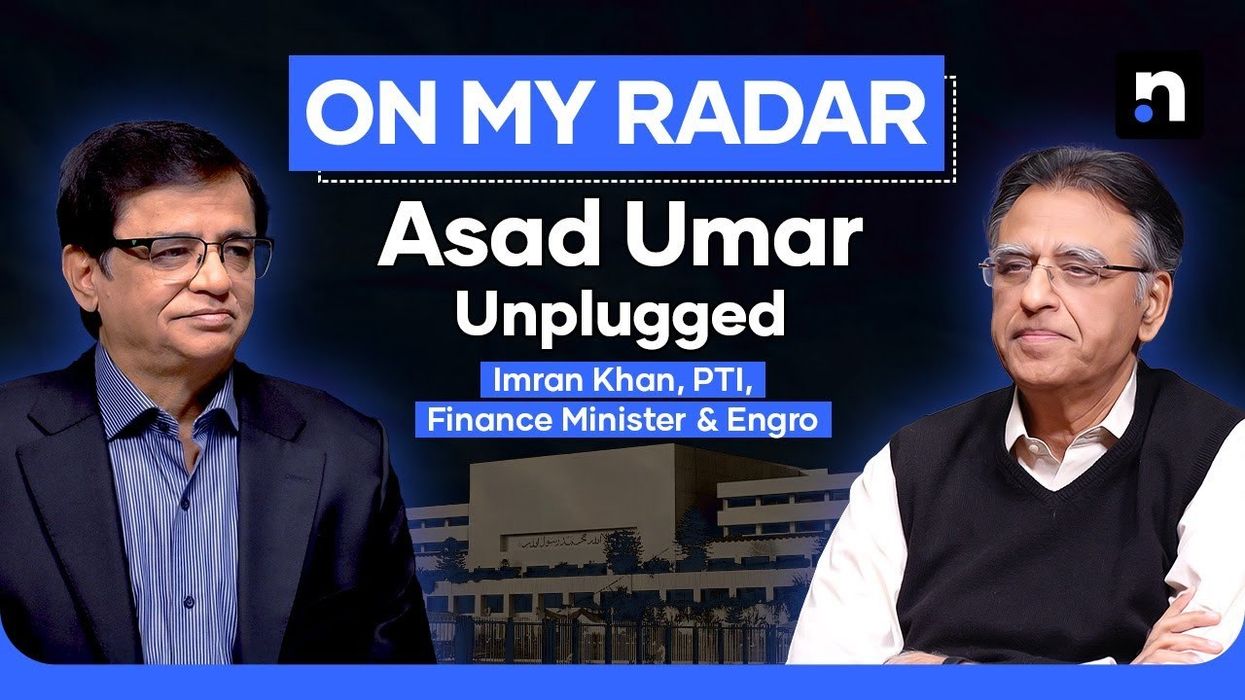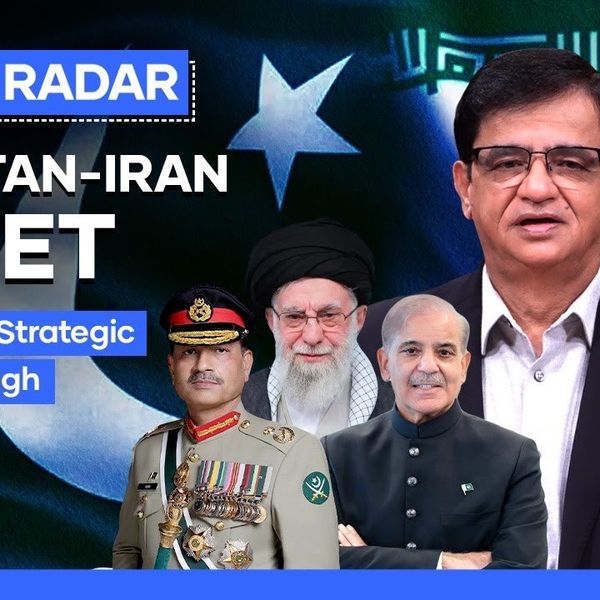Asad Umar opens up on PTI’s past, Imran Khan, and his decision to quit politics
In a podcast with Kamran Khan, ex-finance minister says Khan’s govt miscalculated its political strategy, leading to unnecessary setbacks
News Desk
The News Desk provides timely and factual coverage of national and international events, with an emphasis on accuracy and clarity.
Pakistan's former finance minister Asad Umar reflected on the country's economic trajectory, his entry into politics, and PTI’s governance challenges in a podcast with Kamran Khan.
Discussing the nation’s economic ups and downs, Umar noted that Pakistan outperformed both India and Bangladesh in its early decades but faced uncertainty post-1988.
“From 2002 to 2007, Pakistan saw a period of economic growth,” Umar said, crediting then-President Gen. Pervez Musharraf and Prime Minister Shaukat Aziz for bringing in skilled professionals. He acknowledged Musharraf’s controversial political role but said his governance was effective.
Umar also detailed his political journey, explaining that he met Imran Khan in 2011 while leading the Pakistan Business Council. Initially skeptical, he presented an economic agenda to Khan before deciding to formally join PTI. “I told Imran Khan that I would support him as long as his actions were in Pakistan’s best interest,” he said.
The former minister addressed long-standing speculation regarding PTI’s relationship with the military. He recalled that during the 2014 sit-in, he and other leaders considered quitting due to rumors of military backing. “Imran Khan laughed and told us to relax,” Umar said. However, he acknowledged the military’s role in PTI’s 2018 coalition government and admitted that over-reliance on the establishment was a political mistake.
Discussing the IMF program, Umar said he warned before the 2018 election that Pakistan’s economy was near collapse. Upon assuming office, he initiated talks with the IMF but resisted tough conditions. “IMF officials told us Pakistan’s economy had never been in such bad shape before,” he revealed. To bridge the financing gap, the PTI government sought support from Saudi Arabia, the UAE, and China.
Umar also elaborated on stalled reforms in state-owned enterprises and the energy sector. He advocated for privatization but argued that before selling assets, professional management must replace political control. “We can’t let state companies collapse while waiting for privatization,” he said. On energy, he supported deregulation and a market-based pricing system, criticizing bureaucratic resistance to change.
Addressing his removal as finance minister, Umar said he had no complaints. “The people elected me as an MNA, not as finance minister. That was Imran Khan’s decision,” he said. He recalled that Khan praised his composure after the dismissal.
Umar also praised Jahangir Tareen, calling him one of Pakistan’s most capable administrators. “Tareen’s contributions to PTI were second only to Imran Khan’s,” he said, lamenting that his talent was wasted.
Reflecting on PTI’s governance, Umar admitted that the party mishandled its political strategy by not calling early elections when tensions with the military escalated. He said delaying the dissolution of assemblies in 2022 was a strategic error.
Concluding the discussion, Umar addressed criticism that Imran Khan disregarded the opposition. “From day one, the opposition tried to push the military away from PTI,” he said, adding that political divisions widened due to this dynamic.
From Reham to Bushra Bibi
Umar dismissed speculation about Bushra Bibi’s control over PTI’s affairs, stating, “Put someone in front of me who claims Bushra Bibi was running everything.” He emphasized that very few people were closer to Imran Khan than he was but insisted he never saw any direct evidence of her influence over decision-making.
“I only spoke to Bushra Bibi once in my life when Imran Khan was shot and taken to Shaukat Khanum Hospital,” Umar said, adding that while she was always by Khan’s side, he had no direct interactions with her beyond greetings.
Addressing criticism over Khan’s marriage to Bushra Bibi, Umar said party workers were not opposed to her personally but believed the timing was politically problematic. “They said Khan sahib just ended his marriage with Reham Khan, and now he is remarrying before elections,” Umar recalled.
Umar defended Khan’s personal choices, saying, “Every hardworking man deserves peace at home.” He added that after marrying Bushra Bibi, Khan appeared more composed and less impulsive in his decisions.
Faiz Hameed’s role and influence
Umar described former spymaster Lt. Gen. (retd) Faiz Hameed as a competent officer but dismissed claims that he acted independently of then-army chief Gen. (retd) Qamar Javed Bajwa. “It is impossible that Faiz Hameed did anything without Bajwa’s approval,” he said.
He recounted a dispute over the appointment of the ISI chief, where Khan sought a proper selection process instead of accepting a unilateral decision from the military. This disagreement, Umar said, created rifts that later impacted PTI’s tenure.
Umar also recalled that Bajwa frequently emphasized his neutrality but questioned whether he truly remained neutral or actively influenced political events. “The day Bajwa said he was neutral, it was clear that the ground had shifted,” Umar said.
Gen. Bajwa’s 'neutral stance'
Umar said PTI’s loss of military support was partially due to its own mistakes but also influenced by external pressures. He claimed that opposition leaders, particularly Asif Ali Zardari and Nawaz Sharif, worked to convince Bajwa that PTI was a sinking ship.
“The first real shock came when Hafeez Sheikh lost the Senate election,” Umar said. He added that PTI leaders realized then that their grip on power was loosening.
Divisions within PTI
Umar disclosed internal PTI disagreements over resigning from the National Assembly and dissolving provincial assemblies. “Shah Mehmood Qureshi supported dissolving assemblies but opposed resigning from the National Assembly,” Umar said.
He criticized both decisions, arguing that PTI’s presence in the assemblies could have forced elections earlier. “Had we stayed in the National Assembly, we might have secured elections much sooner,” he said.
No intention of returning to politics
Asad Umar said he has no plans to return to politics. "If I get a chance to sit with Imran Khan, I will definitely go," he said. "We both may have grievances with each other, but I will not express any complaints." However, he made it clear that if Khan asked him to return to politics, he is not prepared for that.
"I may not be able to share the reasons for not returning to politics on air," he said. "But I can explain them to Imran Khan, and I believe he will understand."
Umar added that he would ask Khan how he could serve him in any other way.











Comments
See what people are discussing